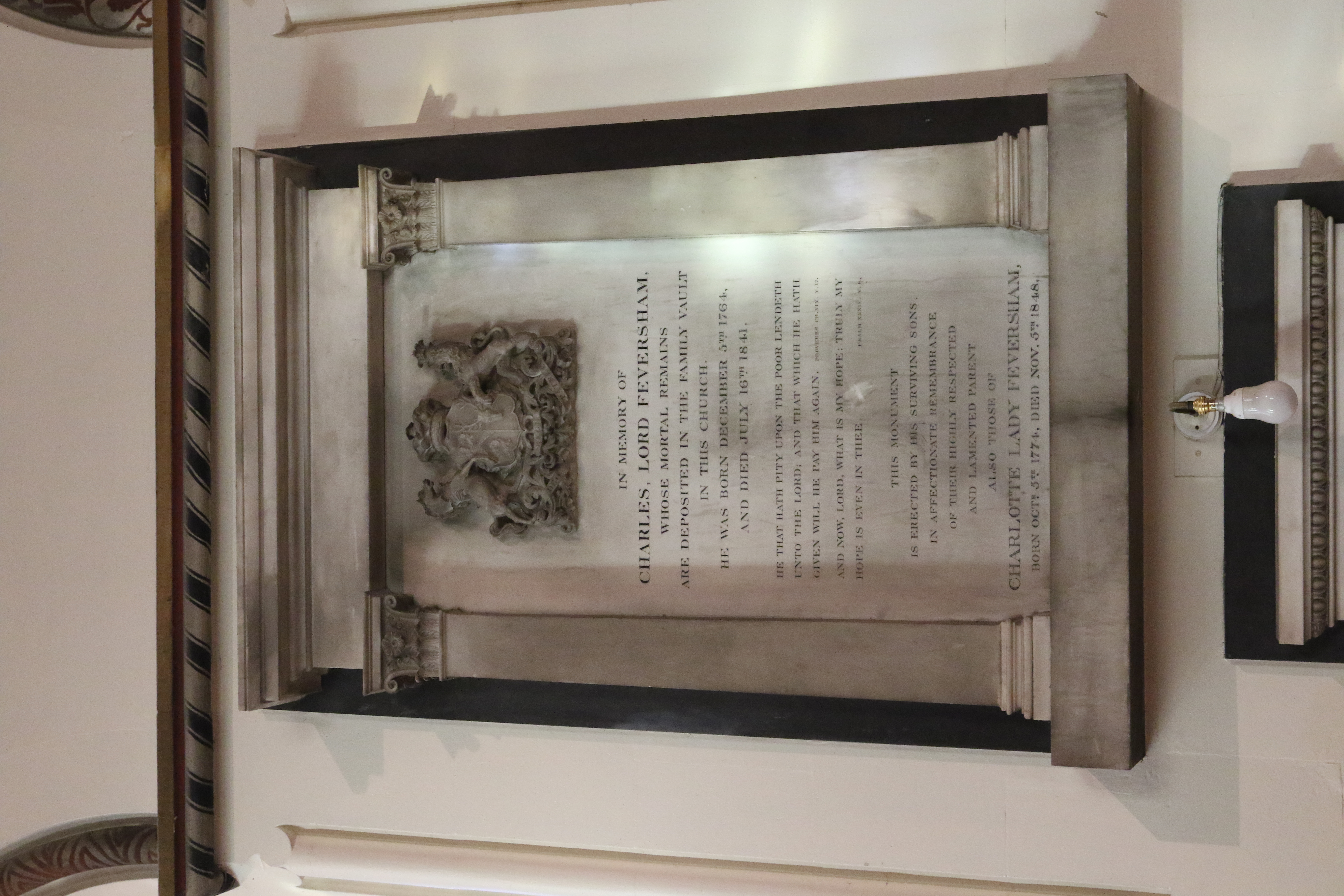Charles Duncombe, 1st Baron Feversham on:
[Wikipedia]
[Google]
[Amazon]


 Charles Duncombe, 1st Baron Feversham (5 December 1764 – 16 July 1841), was a British
Charles Duncombe, 1st Baron Feversham (5 December 1764 – 16 July 1841), was a British
The Peerage, entry for 1st Lord Feversham
/ref> *

 Charles Duncombe, 1st Baron Feversham (5 December 1764 – 16 July 1841), was a British
Charles Duncombe, 1st Baron Feversham (5 December 1764 – 16 July 1841), was a British Member of Parliament
A member of parliament (MP) is the representative in parliament of the people who live in their electoral district. In many countries with bicameral parliaments, this term refers only to members of the lower house since upper house members o ...
.
Biography
Feversham was born the eldest son of Charles Slingsby Duncombe of Duncombe Park and educated at Harrow school (1799). Feversham was appointedHigh Sheriff of Yorkshire
The Sheriff is the oldest secular office under the Crown. Formerly the Sheriff was the principal law enforcement officer in the county but over the centuries most of the responsibilities associated with the post have been transferred elsewhere o ...
in 1790. He was elected to the House of Commons
The House of Commons is the name for the elected lower house of the bicameral parliaments of the United Kingdom and Canada. In both of these countries, the Commons holds much more legislative power than the nominally upper house of parliament. T ...
for Shaftesbury
Shaftesbury () is a town and civil parish in Dorset, England. It is situated on the A30 road, west of Salisbury, near the border with Wiltshire. It is the only significant hilltop settlement in Dorset, being built about above sea level on a ...
in 1790, a seat he held until 1796, and then represented Aldborough from 1796 to 1806, Heytesbury
Heytesbury is a village (formerly considered to be a town) and a civil parish in Wiltshire, England. The village lies on the north bank of the Wylye, about southeast of the town of Warminster.
The civil parish includes most of the small neig ...
from 1812 to 1816 and Newport, Isle of Wight
Newport is the county town of the Isle of Wight, an island county off the south coast of England. The town is slightly north of the centre of the island, and is in the civil parish of Newport and Carisbrooke. It has a quay at the head of the na ...
from 1818 to 1826. However, he never held ministerial office. On 14 July 1826 he was raised to the peerage as Baron Feversham, ''of Duncombe Park in the County of York''.
Marriage and children
Lord Feversham married Lady Charlotte Legge, daughter ofWilliam Legge, 2nd Earl of Dartmouth
William Legge, 2nd Earl of Dartmouth, PC, FRS (20 June 1731 – 15 July 1801), styled as Viscount Lewisham from 1732 to 1750, was a British statesman who is most remembered as the namesake of Dartmouth College.
Background
Dartmouth was the s ...
, in 1795. They had eight children together:/ref> *
Hon.
''The Honourable'' (British English) or ''The Honorable'' (American English; American and British English spelling differences#-our, -or, see spelling differences) (abbreviation: ''Hon.'', ''Hon'ble'', or variations) is an honorific Style (ma ...
Frances Duncombe (born 30 May 1803, died 15 June 1881)
* Hon. Louisa Duncombe (born 16 November 1807, died 18 November 1852)
* Charles Duncombe (born 29 July 1796, died 2 April 1819)
* William Duncombe, 2nd Baron Feversham (born 14 January 1798, died 11 February 1867)
* The Reverend
The Reverend is an honorific style most often placed before the names of Christian clergy and ministers. There are sometimes differences in the way the style is used in different countries and church traditions. ''The Reverend'' is correctly ...
and Hon. Henry Duncombe (born 25 August 1800, died 1 October 1832)
* Admiral the Hon. Arthur Duncombe (born 24 March 1806, died 6 February 1889)
* The Very Reverend
The Very Reverend is a style given to members of the clergy. The definite article "The" should always precede "Reverend" as "Reverend" is a style or fashion and not a title.
Catholic
In the Catholic Church, the style is given, by custom, to pri ...
and Hon. Augustus Duncombe, DD (born 2 November 1814, died 26 January 1880), Dean of York 1858–1880.
* Hon. Octavius Duncombe (born 8 April 1817, died 3 December 1879)
Feversham died in July 1841, aged 76, and was succeeded in the barony by his son William
William is a male given name of Germanic origin.Hanks, Hardcastle and Hodges, ''Oxford Dictionary of First Names'', Oxford University Press, 2nd edition, , p. 276. It became very popular in the English language after the Norman conquest of Engl ...
. His younger sons Arthur
Arthur is a common male given name of Brythonic origin. Its popularity derives from it being the name of the legendary hero King Arthur. The etymology is disputed. It may derive from the Celtic ''Artos'' meaning “Bear”. Another theory, more wi ...
and Octavius were both Conservative politicians who served in Parliament. Lady Feversham died in 1848.
References
* * Kidd, Charles, Williamson, David (editors). ''Debrett's Peerage and Baronetage'' (1990 edition). New York: St Martin's Press, 1990, * * *External links
* {{DEFAULTSORT:Feversham, Charles Duncombe, 1st Baron 1764 births 1841 deaths People educated at Harrow School Barons in the Peerage of the United Kingdom Duncombe, Charles Duncombe, Charles Duncombe, Charles Duncombe, Charles Duncombe, Charles Duncombe, Charles Duncombe, Charles Duncombe, Charles Duncombe, Charles UK MPs who were granted peerages Place of birth missing Place of death missing High Sheriffs of Yorkshire Charles Peers of the United Kingdom created by George IV